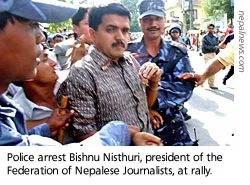New York, June 8, 2005—Riot police in the Nepalese capital, Kathmandu, today arrested dozens of journalists who were protesting the government’s emergency press restrictions and proposed media law amendments that are expected to codify and stiffen those constraints. Local sources said police detained as many as 50 journalists, including the president of the Federation of Nepalese Journalists (FNJ), Bishnu Nisthuri, and that they remained behind bars at day’s end.
“We are deeply concerned for the safety of our colleagues and call for their immediate and unconditional release,” said Ann Cooper, executive director of the Committee to Protect Journalists.
Hundreds of journalists gathered at the Bhrikuti Mandap exhibition grounds in central Kathmandu for the afternoon demonstration organized by the FNJ. Activities in the exhibition grounds are restricted by the government; public demonstrations have been banned throughout the city center since the king declared a state of emergency on February 1, according to local news reports.
Police surrounded the grounds and tried to bar journalists from leaving, according to press reports. Fighting broke out when journalists tried to leave, and several were injured when baton-wielding police officers advanced and forced the journalists into police vans, according to the Press Trust of India news service. The journalists were being held today at the Mahendra Police Club.
A group of senior journalists—including Taranath Dahal and Kanak Mani Dixit, editor and publisher of the Nepalese-language Himal Khabarpatrika magazine—visited the police station and unsuccessfully sought the release of their colleagues, local sources told CPJ.
In another development yesterday, the Supreme Court overturned a government order to shut down Communication Corner, a radio production and distribution company. The Ministry of Information sent a letter to the private company on May 27, ordering its closure because it was allegedly being “illegally operated.” Journalists began publicly protesting the ban and other FM radio restrictions on June 1.
Other journalists across the country are also protesting media restrictions. The BBC reported that journalists in Nepal’s second city, Biratnagar, have started reading the news over loudspeakers, and that other FM stations are reading aloud sections of the constitution that guarantee a free press.
FM radio was once a vibrant part of the local media with more than 50 stations, but it has suffered greatly since King Gyanendra declared a state of emergency on February 1. Amendments now under review would officially bar radio stations from broadcasting any kind of news, according to local news reports. The proposed amendments would also increase penalties for violating the law, impose new restrictions on media ownership, and prohibit news that causes “hatred” or “disrespect” of the king.
![]()
